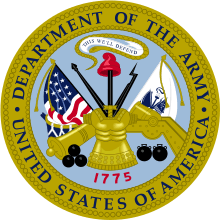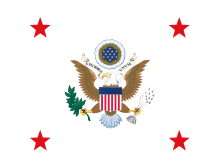United States Secretary of the Army
| Secretary of the Army
SECARMY | |
|---|---|
|
| |
|
Flag of the Secretary of the Army[1] | |
| Department of the Army | |
| Style |
Mister Secretary The Honorable (formal address in writing) |
| Reports to |
Secretary of Defense Deputy Secretary of Defense |
| Appointer |
The President with the advice and consent of the Senate |
| Term length | No fixed term |
| Inaugural holder | Kenneth Claiborne Royall |
| Formation | September 18, 1947 |
| Succession | 2nd in SecDef succession |
| Deputy |
The Under Secretary (principal civilian deputy) The Chief of Staff (military advisor and deputy) |
| Salary | Level II of the Executive Schedule |
| Website | Official website |
The Secretary of the Army (SA or SECARMY) is a senior civilian official within the Department of Defense of the United States of America with statutory responsibility for all matters relating to the United States Army: manpower, personnel, reserve affairs, installations, environmental issues, weapons systems and equipment acquisition, communications, and financial management.
The Secretary of the Army is nominated by the President and confirmed by the U.S. Senate, the Secretary of the Army is a non-Cabinet position serving under the Secretary of Defense.[2] This position was created on September 18, 1947, replacing the Secretary of War, when the Department of War became the Department of the Army and was made a department within the new Department of Defense.[3]
Eric Fanning took office as acting secretary on November 3, 2015. He stepped aside on January 11, 2016, while awaiting Senate confirmation, and Undersecretary of the Army Patrick Murphy took on the additional role of Acting Secretary.[4] The U.S. Senate confirmed Fanning's nomination on May 17, 2016.[5]
Responsibilities
The Senior Leadership of the Department of the Army consists of two civilians—the Secretary of the Army and the Under Secretary of the Army—and two military officers of four-star rank—the Chief of Staff of the Army and the Vice Chief of Staff of the Army.
The Secretary of the Army (10 U.S.C. § 3013) is in effect the chief executive officer of the Department of the Army, and the Chief of Staff of the Army works directly for the Secretary of the Army. The Secretary presents and justifies Army policies, plans, programs, and budgets to the Secretary of Defense, other executive branch officials, and to the Congressional Defense Committees. The Secretary also communicates Army policies, plans, programs, capabilities, and accomplishments to the public. As necessary, the Secretary convenes meetings with the senior leadership of the Army to debate issues, provide direction, and seek advice. The Secretary is a member of the Defense Acquisition Board.
The Secretary of the Army has several responsibilities under the Uniform Code of Military Justice, including the authority to convene general courts-martial and management of the Civilian Aides to the Secretary of the Army Program.[6]
Office of the Secretary of the Army
The Office of the Secretary of the Army is composed of the Under Secretary of the Army, the Assistant Secretaries of the Army, the Administrative Assistant to the Secretary of the Army, the General Counsel of the Department of the Army, the Inspector General of the Army, the Chief of Legislative Liaison, and the Army Reserve Forces Policy Committee. Other offices may be established by law or by the Secretary of the Army. No more than 1,865 officers of the Army on the active-duty list may be assigned or detailed to permanent duty in the Office of the Secretary of the Army and on the Army Staff.[7]
- Under Secretary of the Army
- Assistant Secretary of the Army (Acquisition, Logistics, and Technology)
- Assistant Secretary of the Army (Civil Works)
- Assistant Secretary of the Army (Financial Management and Comptroller)
- Assistant Secretary of the Army (Installations, Energy and Environment)
- Assistant Secretary of the Army (Manpower and Reserve Affairs)
- General Counsel of the Army
- Administrative Assistant to the Secretary of the Army
- Inspector General of the Army
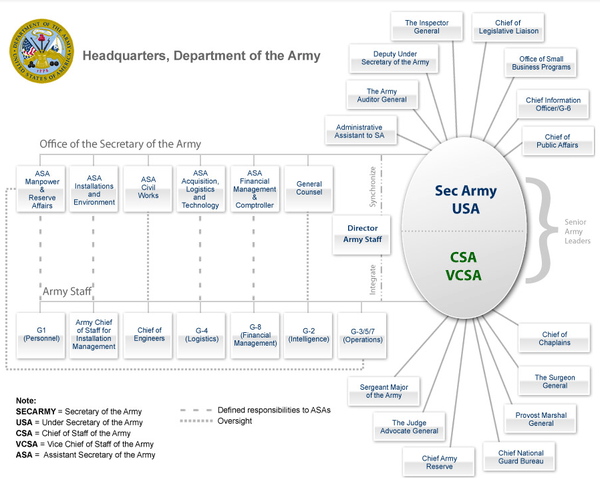
Chronological list of Secretaries of the Army
Kenneth Claiborne Royall, the last Secretary of War, became the first Secretary of the Army when the National Defense Act of 1947 took effect and was the last Army secretary to hold the cabinet status, which was henceforth assigned to the Secretary of Defense.[3][8]
| Photo | Name | Term of office | President(s) served under |
|---|---|---|---|
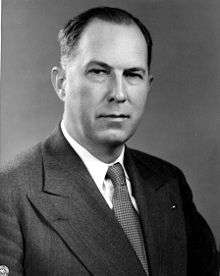 |
Kenneth Claiborne Royall | September 18, 1947 – April 27, 1949 | Harry S. Truman |
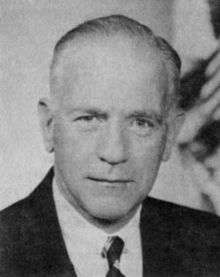 |
Gordon Gray[9] | April 28, 1949 – April 12, 1950 | Harry S. Truman |
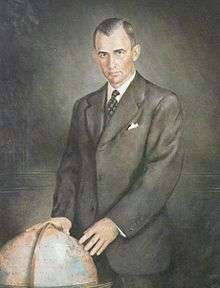 |
Frank Pace | April 12, 1950 – January 20, 1953 | Harry S. Truman |
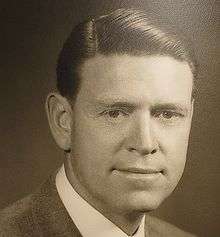 |
Earl D. Johnson (acting)[9] | January 20, 1953 – February 4, 1953 | Dwight D. Eisenhower |
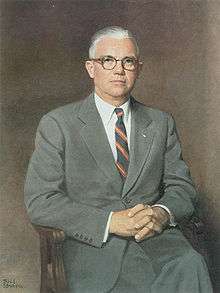 |
Robert T. Stevens | February 4, 1953 – July 21, 1955 | Dwight D. Eisenhower |
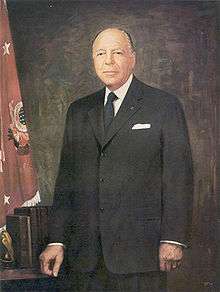 |
Wilber M. Brucker | July 21, 1955 – January 19, 1961 | Dwight D. Eisenhower |
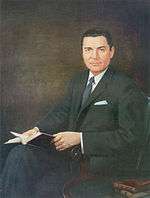 |
Elvis Jacob Stahr, Jr. | January 24, 1961 – June 30, 1962 | John F. Kennedy |
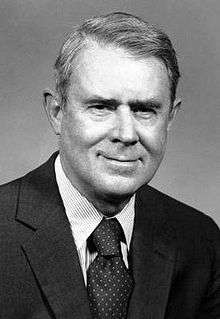 |
Cyrus Roberts Vance | July 5, 1962 – January 21, 1964 | John F. Kennedy, Lyndon B. Johnson |
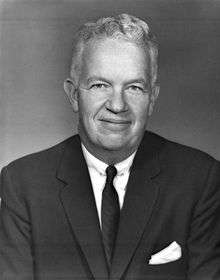 |
Stephen Ailes | January 28, 1964 – July 1, 1965 | Lyndon B. Johnson |
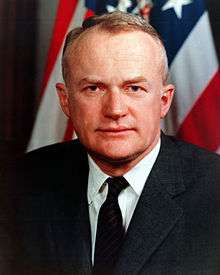 |
Stanley R. Resor | July 2, 1965 – June 30, 1971 | Lyndon B. Johnson, Richard Nixon |
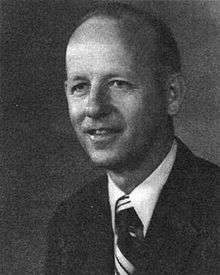 |
Robert F. Froehlke | July 1, 1971 – May 14, 1973 | Richard Nixon |
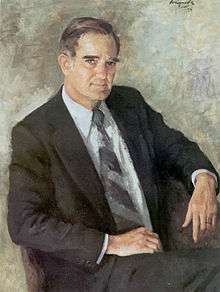 |
Howard H. Callaway | May 15, 1973 – July 3, 1975 | Richard Nixon, Gerald Ford |
 |
Norman R. Augustine (acting)[9] | July 3, 1975 – August 5, 1975 | Gerald Ford |
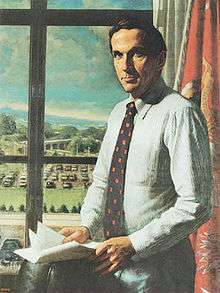 |
Martin R. Hoffmann | August 5, 1975 – January 20, 1977 | Gerald Ford |
 |
Clifford L. Alexander, Jr. | February 14, 1977 – January 20, 1981 | Jimmy Carter |
| Percy A. Pierre (acting)[9] | January 21, 1981 – January 29, 1981 | Jimmy Carter | |
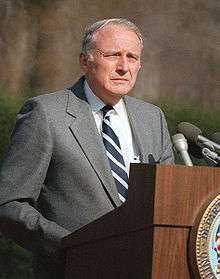 |
John O. Marsh, Jr. | January 30, 1981 – August 14, 1989 | Ronald Reagan, George H. W. Bush |
| Michael P. W. Stone | August 14, 1989 – January 20, 1993 | George H. W. Bush | |
| John W. Shannon (acting)[10] | January 20, 1993 – August 26, 1993 | Bill Clinton | |
| Gen. Gordon R. Sullivan (acting)[11][12] | August 28, 1993 – November 21, 1993 | Bill Clinton | |
| Togo D. West, Jr. | November 22, 1993 – May 4, 1997 | Bill Clinton | |
 |
Robert M. Walker (acting)[9] | December 2, 1997 – July 1, 1998 | Bill Clinton |
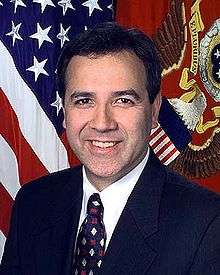 |
Louis Caldera | July 2, 1998 – January 20, 2001 | Bill Clinton |
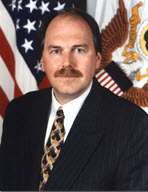 |
Gregory R. Dahlberg (acting) | January 20, 2001 – March 4, 2001 | George W. Bush |
 |
Joseph W. Westphal (acting)[9] | March 5, 2001 – May 31, 2001 | George W. Bush |
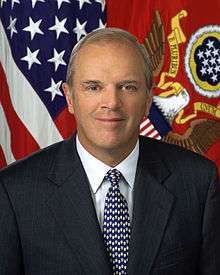 |
Thomas E. White | May 31, 2001 – May 9, 2003 | George W. Bush |
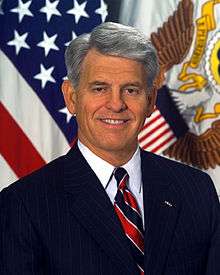 |
Les Brownlee (acting) | May 10, 2003 – November 18, 2004 | George W. Bush |
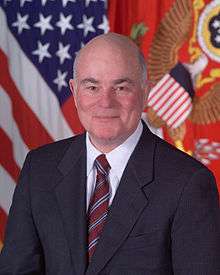 |
Francis J. Harvey | November 19, 2004 – March 9, 2007 | George W. Bush |
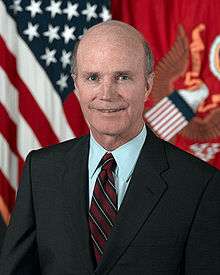 |
Pete Geren | March 9, 2007 – September 21, 2009 | George W. Bush, Barack Obama |
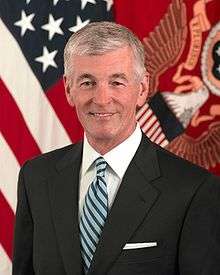 |
John M. McHugh | September 21, 2009 – November 1, 2015 | Barack Obama |
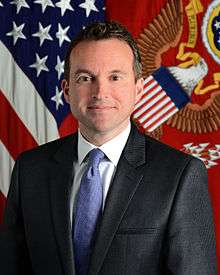 |
Eric Fanning (acting) | November 3, 2015 – January 11, 2016 | Barack Obama |
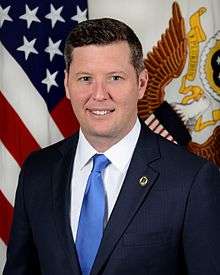 |
Patrick Murphy (acting) | January 11, 2016 - May 17, 2016 | Barack Obama |
 |
Eric Fanning | May 17, 2016 – present | Barack Obama |
References
- ↑ http://www.apd.army.mil/pdffiles/r840_10.pdf, accessed on 2012-01-04.
- ↑ "US CODE: Title 10,3013. Secretary of the Army". Retrieved September 22, 2007.
- 1 2 Bell, William Gardner (1992). ""Kenneth Claiborne Royall"". Secretaries of War and Secretaries of the Army: Portraits and Biographical Sketches. United States Army Center of Military History. Retrieved September 22, 2007.
- ↑ Loita C. Baldor. "Army Acting Secretary Steps Aside amid Stalled Nomination". Associated Press, January 11, 2016
- ↑ "U.S. Senate backs Fanning as Army secretary". Reuters. May 17, 2016. Retrieved May 17, 2016.
- ↑ "Secretary of the Army". Archived from the original on September 21, 2007. Retrieved September 22, 2007.
- ↑ "US CODE: Title 10,3014. Office of the Secretary of the Army". Retrieved September 22, 2007.
- ↑ Bell, William Gardner. ""Intro - Secretaries of War & Secretaries of the Army"". Secretaries of War and Secretaries of the Army: Portraits & Biographical Sketches. Retrieved September 22, 2007.
- 1 2 3 4 5 6
- Bell, William Gardner (1992). Secretaries of War and Secretaries of the Army: Portraits and Biographical Sketches. Washington, D.C.: United States Army Center of Military History.
- ↑ "Secretary of the Army Accused of Shoplifting", Stephanie Griffith and Bill Miller, The Washington Post, August 28, 1993
- ↑ The Daily Sentinel (Ohio/West Virginia), Acting Army Chief Ticketed for Shoplifting, August 29, 1993
- ↑ U.S. Organization Chart Service, Department of Defense Fact Book, 2006, page 17
